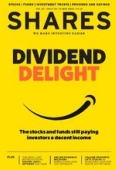Archived article
Please note that tax, investment, pension and ISA rules can change and the information and any views contained in this article may now be inaccurate.
What can I put into a pension now I’m retired?

I finished my last employment in November 2018 and that was when I made my last pension contribution. I opened a SIPP just before this and put in a small amount of cash.
I am effectively retired at 59 but living off cash savings and have recently received an inheritance and a matured endowment.
Can this money be used as part of my three previous years’ pension allowance (subject to the amount I earned whilst still in employment) or am I now restricted to the minimum £3,600 limit of non-income related investment?
Mark
Tom Selby, AJ Bell Senior Analyst says:
First of all let’s just briefly recap how the pensions annual allowance works in the UK.
The amount you can save in a pension each tax year is controlled by the annual allowance – set at £40,000 for most people – and your UK relevant earnings. Specifically, HMRC rules say you can only contribute up to 100% of your UK relevant earnings into a pension during the tax year.
So if, for example, someone had UK relevant earnings of £10,000 in the current tax year, the maximum they could save in a pension would be £10,000 in that year (inclusive of tax relief).
Your annual allowance may be lower if you have triggered either the annual allowance taper or the money purchase annual allowance (MPAA).
The taper only kicks in if you have ‘threshold’ income above £200,000 and ‘adjusted’ income above £240,000. Where both income measures are breached, your annual allowance reduces by £1 for every £2 of adjusted income, to a minimum of £4,000 for those with adjusted income above £312,000.
You can read more about how the taper works here.
The MPAA is triggered if you flexibly access taxable income from your pension, and reduces your annual allowance to £4,000. You can read more about how the MPAA works here.
It is possible to ‘carry forward’ up to three years of unused annual allowances from the previous three tax years in the current tax year, but the amount you can save into a pension remains restricted by your UK relevant earnings in the current tax year.
You must also have used up your entire annual allowance in the current tax year before carrying forward any unused allowances from previous tax years.
One important point to note is that anyone who triggers the MPAA loses the ability to carry forward unused allowances and you must have been a member of a UK pension scheme in order to use carry forward.
You can read more about how carry forward works here.
Where someone has no UK relevant earnings they can still pay into a pension, although the contribution limit is £3,600 a year.
DO YOU HAVE A QUESTION ON RETIREMENT ISSUES?
Send an email to editorial@sharesmagazine.co.uk with the words ‘Retirement question’ in the subject line. We’ll do our best to respond in a future edition of Shares.
Please note, we only provide information and we do not provide financial advice. If you’re unsure please consult a suitably qualified financial adviser. We cannot comment on individual investment portfolios.
Important information:
These articles are provided by Shares magazine which is published by AJ Bell Media, a part of AJ Bell. Shares is not written by AJ Bell.
Shares is provided for your general information and use and is not a personal recommendation to invest. It is not intended to be relied upon by you in making or not making any investment decisions. The investments referred to in these articles will not be suitable for all investors. If in doubt please seek appropriate independent financial advice.
Investors acting on the information in these articles do so at their own risk and AJ Bell Media and its staff do not accept liability for losses suffered by investors as a result of their investment decisions.

 magazine
magazine








